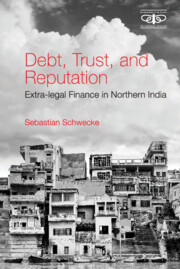7 - Disappearance
Published online by Cambridge University Press: 30 November 2021
Summary
This is the kind of stuff one came across in Munshi Premchand's stories only. However, the holy city of Varanasi is witnessing a grim repeat of the sad tales of exploitation in the 21st century. Only the villain has changed from the dhoti-clad wily ‘soodkhor’ to a sweettalking lawyer/businessman/city corporator or panchayat member.
By the early 2010s, when I started my research with an ethnographic study of money lending practices in Banaras, extra-legal finance there was flourishing or, it could be said, it was continuing to flourish. It had lost a major share of its predominance in financing trade and petty industry to ‘organized’ banking, and in doing so had shed its links to elaborate forms of mercantile ethics. It had lost its position in the lives of the city's elites (as lenders), and of the city's upper-middle classes (as debtors and lenders). It had lost its importance in financing high-level investments – especially real estate and education. It even had lost ground to regulated forms of banking in financing various other consumption purposes. As one debtor I interviewed put it:
The banks have a special credit scheme for purchasing scooters. It makes getting a loan quick and easy, and the bank cannot say no to you. When I want to get a loan to buy a scooter, I go to the bank. When I want to buy anything else, I go to the moneylender.
Within the spectrum of this ‘anything else’, extra-legal finance continued to be a ubiquitous occurrence: not everyone went to a moneylender for loans, but everyone beyond the upper-middle class knew people who had experience with moneylenders, and had an idea of who could be approached in the neighbourhood. Everyone knew that money lending was flourishing. Within this spectrum of ‘anything else’, as it turned out, two things really had changed. First, all forms of extra-legal finance had become significantly more exploitative since the late colonial period. And second, the operational modes of extra-legal finance had changed, in some respects subtly, yet – taken altogether – in quite dramatic ways. For Indian public opinion, though, it seemed as if extra-legal finance had ceased to exist, as if it was visible only in Munshi Premchand's stories.
- Type
- Chapter
- Information
- Debt, Trust, and ReputationExtra-legal Finance in Northern India, pp. 228 - 271Publisher: Cambridge University PressPrint publication year: 2022



